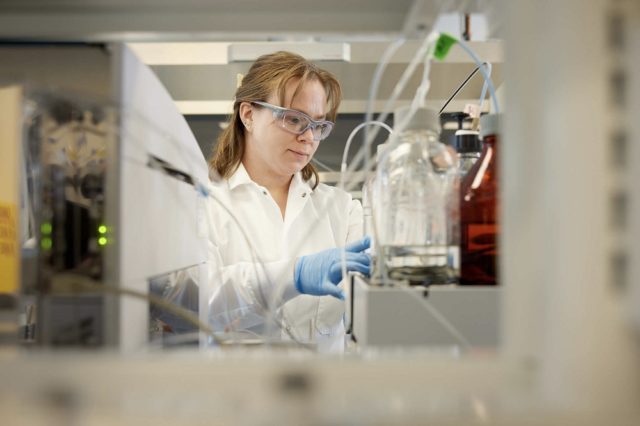
Empress Therapetuics scientist Paige Mandelare using high-performance liquid chromatography to purify a novel small molecule discovered via the company’s Chemilogics platform.
Mother Nature is the original medicinal chemist. The history of drug research is full of efforts to reveal and replicate her work. And there’s a lot of it. We have cancer drugs derived from tree bark and antibiotics that come from the soil. But one realm that’s relatively untapped as a source of new medicines is the human body itself.
Empress Therapeutics co-founder and CEO Jason Park acknowledges that many currently available medicines were inspired by nature. But he adds that there are plenty of small molecules already inside of us that hold promise as new drugs. These molecules make sense for drug research because they co-evolved with humans in states of both health and disease.
“Isn’t the most likely place to find chemicals that impact the human body inside the human body?” Park asked.
Empress is making humans, or more specifically, human data, its new drug hunting ground. The startup, which has been incubating within the laboratories of venture capital firm Flagship Pioneering for the past two years, launched on Wednesday. The Cambridge, Massachusetts-based company is backed by the customary $50 million that Flagship puts behind its startups at launch. It also has drug leads, and the most advanced of them could begin human testing as soon as next year.
The roots of Empress date back about six years, said Park, who is also operating partner at Flagship. The idea was to apply the power of genetics to chemistry in order to make small molecule drug discovery more efficient and productive. Empress’s approach starts with clinical data, such as spit samples, stool samples, and biopsies. Some of those data are public but the company also has proprietary clinical data. Algorithms read the DNA like a language to identify sequences that encode instructions for chemistry in the body that can be therapeutic.
In human history, there have been about 100 billion humans on the planet, Park said. But chemistry predates human life, cellular life, and single-cell life. Proteins and chemistry co-evolved, and the microbes in humans essentially served as tiny medicinal chemists. Park said evolution has tested and selected chemical compounds that could become drugs, and these molecules are just waiting to be discovered inside the human body.
“The largest clinical trial in history has effectively been run across the 100 billion humans that have ever lived,” Park said.
There’s precedent for identifying drugs from compounds found inside the human body. Insulin might be the best known example. Another one is Amgen’s Epogen, which is based on erythropoietin, a hormone produced in the kidneys. But Park said hunting for drugs in the human body hasn’t been done on a large scale, partly because the technological tools that enable it became available only within the pasts decade. In addition to artificial intelligence and computational technologies, Empress also employs synthetic biology. The company calls its tech platform Chemilogics, which is a combination of “chemistry” and “biologics.”
Empress isn’t the first startup to apply such new technological tools to drug discovery research, but Park believes his company is taking a novel approach. Small molecule companies traditionally screen hundreds of thousands, perhaps millions of compounds to find the ones that can hit a particular target. Park said Empress is using genetics to learn which molecules are important and what those molecules do. The company then looks for drug-like properties, such as potency against a target and selectivity to that target. Some of those molecules are good to go as drugs just as they’re found in the body, but others may need a bit of tweaking to make them better medicines.
“Evolution doesn’t tend to select the best possible version, it tends to select what works,” Park said. “[Empress] can improve that.”
With its technology platform, Empress is developing small molecules that address various classes of proteins, such as cytokines, enzymes, G protein-coupled receptors, and ion channels. The molecules have potential applications across a range of therapeutic areas including immune disorders, metabolic disease, neurology, cancer, and pain. Empress’s R&D efforts are led by newly appointed Chief Scientific Officer Murray McKinnon, whose experience includes serving as global head of the World Without Disease Accelerator at Janssen Pharmaceuticals, a Johnson & Johnson subsidiary. McKinnon has also held senior immunology discovery roles at Janssen and Bristol Myers Squibb.
In the past two years, Empress’s technology has yielded 15 drug leads. Park said the efficiency of the platform means that there’s strong potential for more growth. Finding pharmaceutical partners to further develop its drug assets is an option, and Park said Empress will look closely at those opportunities.
Photo by Empress Therapeutics








